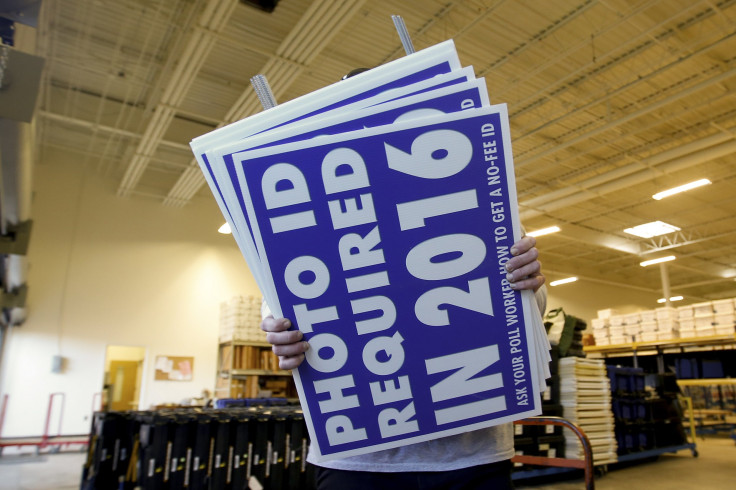Do Voters Have To Show ID? Trump Call For Investigation Has Civil Rights Groups Worried About New Efforts To Suppress Voting

Civil and voting rights groups were bracing for a new wave of voter suppression efforts after President Donald Trump called for a “major investigation” into voter fraud in a tweet Wednesday.
The president’s tweet suggested Trump will use the White House to support a recent Republican strategy on voter registration: Claim widespread voter fraud in order to implement measures that restrict access to the ballot. The president previously claimed, without evidence, that three million to five million people voted illegally in November’s election, echoing claims he made during last year’s campaign that the election was “rigged.”
Civil rights groups saw the president's voter fraud claims as an indication that a Trump administration would be hostile to voting rights. Civil rights groups have widely opposed Trump's nominee for attorney general, Alabama Sen. Jeff Sessions, citing his failed prosecution of voting rights activists in Alabama.
"False claims like these are often stalking horses to roll back voting rights," Scott Simpson, a spokesperson for the Leadership Conference on Civil and Human Rights said in an email to International Business Times Wednesday. "Politicians who want to continue denying voting rights to people of color can’t legitimately justify them with facts, so they invented Chicken Little stories and conspiracy theories like President Trump has."
Civil rights groups like the NAACP Legal Defense and Educational Fund saw these claims as part of larger effort to disenfranchise voters.
"This administration continues to perpetuate a falsehood, a falsehood with disastrous consequences,” Sherrilyn Ifill, President of the NAACP Legal Defense and Educational Fund said in a statement on Tuesday. “The truth and the facts are the same: there is no credible evidence of widespread voter fraud; rather, millions of minority votes were suppressed around the country by laws designed to keep voters, especially Black and Latino voters, from being able to access the ballot.”
His lie abt voter fraud is same lie GOP used in NC to justify worst voter suppression law in the country, which was overturned by fed court.
— Rev. Dr. William J. Barber II (@RevDrBarber) January 25, 2017
Trump's false claims re undocumented people voting is a set up for a new round of voter suppression. https://t.co/UIESb3Ez8X
— Keith Ellison (@keithellison) January 25, 2017
Voter fraud is a myth. But our courts have already made clear that voter suppression was rampant in the last election. -@CornellWBrooks
— NAACP (@NAACP) January 25, 2017
While voter fraud claims have been widely debunked, states continue to implement laws that make it more difficult to vote, often using unfounded claims of voter fraud as justification. An election law expert told the New York Times in October that Trump’s claims of voter fraud fit a recurring pattern. “It is, in fact, an often-repeated theme by those on the right who have been claiming, especially since 2000, that Democrats are stealing elections with voter fraud,” said Richard L. Hasen, who is also a professor of political science and law at the University of California, Irvine.
If Democrats were stealing elections, they haven't done a very good job of it. Republicans now control the White House, both houses of Congress, 31 governorships and both chambers of the legislature in 32 states. This kind of electoral domination by the GOP at both the state and federal level hasn't been seen since the Civil War. The 2016 presidential election was also the first since the 1965 Voting Rights Act was gutted by Supreme Court in 2013's Shelby County v. Holder. Fourteen states had new voting restrictions in effect in 2016.
These voting restrictions usually take the form of voter ID legislation — laws which require identification to vote. Supporters of these laws said they simply ensure that voters are who they claim to be. However, opponents pointed out that many people who are eligible to vote don’t have government IDs, especially poor people and minorities who usually vote for Democrats.
A 2016 study by political scientists at the University of California, San Diego, looked at election turnout between 2008 and 2012 and found "substantial drops in turnout for minorities [in states with] strict voter ID laws." These drops hurt Democrats: While Republican turnout fell by 4.6 percentage points in states with these laws, Democratic turnout fell 7.7 percentage points.
Battles over these measures have played out in the courts, which have occasionally struck down voter ID laws for being discriminatory. On Monday, the Supreme Court declined to hear an appeal by Texas to overturn a lower court's finding that the state's voter ID law was discriminatory. In August of last year, the high court split 4-4 while deciding whether to allow provisions of a North Carolina voting law to go back into effect after a lower court said the law targeted "African-Americans with almost surgical precision."
The split kept the lower court's ruling in place. But with Trump expected to announce a Supreme Court nominee next week, the court could rule very differently in future cases. With Republicans dominating state legislatures across the country and the president making patently false claims about voter fraud, there will most likely be plenty of voting rights cases for the court to decide in the coming years.
© Copyright IBTimes 2024. All rights reserved.






















